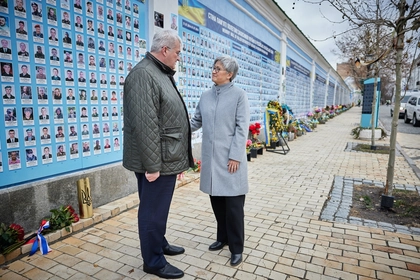The European Union is aiming to broaden sanctions against Russia by including foreign subsidiaries of European companies under the regulations umbrella, a senior official has said.
The move will hopefully block the flow of goods that may be aiding Russia’s military efforts, EU sanctions envoy David O’Sullivan said at an event in Brussels on Wednesday.
JOIN US ON TELEGRAM
Follow our coverage of the war on the @Kyivpost_official.
“A lot of the product going through China [to Russia] is coming from subsidiaries of Western companies in Southeast Asia,” O’Sullivan said, according to a report in the Polish national news network TVP World.
“We are focusing our efforts more on trying to stop the transshipment from there through to China.”
The EU has issued 14 rounds of sanctions since Russia's February 2022 full-scale invasion of Ukraine. The restrictions have grown increasingly stringent, but extensive loopholes in the regulations have allowed many companies to continue business with Russia through partners in third-party countries. The next round of sanction proposals set to be discussed next month will aim to close these gaps.
One of the targets of the new sanctions will be to include a no resale clause. Currently restrictions have not prevented some European companies to use their foreign subsidiaries to sell on sensitive products to Russian businesses.
“One of the ideas we had was to extend the no resale to Russia clause… which we now wanted to extend to subsidiaries,” O’Sullivan said.

Drones Strike High-Rise Buildings in Russia’s Kazan
But any EU-wide sanction policy requires unanimous agreement among all 27 member states, a bar that has become increasingly difficult to reach as some national leaders might have to contend with the potential domestic economic fallout that could result from a new round of sanctions.
O’Sullivan said the European Commission is currently conducting an impact assessment to explore how such measures might be implemented, with the findings potentially influencing a future sanctions package.
Stricter sanctions on Russia are overdue
Millions of barrels of fuel derived from Russian oil were still being imported into the UK despite the sanctions, according to a report by the Centre for Research on Energy and Clean Air (CREA) shared by the BBC in February.
A loophole allows Russian crude oil to be refined in countries like India, with the resulting products then sold to the UK. These companies are not acting illegally according to the wording of existing sanctions, the experts said, but they are going against the spirit of the regulations.
There have been previous efforts to close the loopholes, according to two EU diplomats who spoke to the Financial Times. But the attempts were not well-received by stakeholders, they said. The diplomats suggested that a comprehensive impact assessment addressing these concerns may be enough to gather the support needed to pass a more robust sanctions package.
Enforcement is a major problem
Beyond strengthening the sanctions regulations themselves, some economists have argued that a more robust enforcement mechanism that holds companies to account for not adhering to regulations is needed.
“Stronger regulations for subsidiaries are crucial but should also be paired with monitoring and holding companies to account for negligence,” Olena Bilousova, a sanctions expert from the Kyiv School of Economics Institute, told TVP.
New sanctions could enhance the EU’s blockade, Bilousova said, but are still unlikely to match the strength of US sanctions against Russia. The US regulates any product manufactured using American technology or equipment, even if it is produced abroad by foreign companies.
The EU closed some gaps in the latest sanctions package that was introduced in July, which granted the alliance authority to target financial institutions outside EU borders if they are found to be facilitating trade with Russia. The update brings EU sanctions more in line with US sanctions.
“The US threatened one bank in China, one bank in Turkey, and one bank in the UAE. And the mere threat of imposing the sanctions was sufficient for these financial institutions to stop all business,” O’Sullivan said.
Trade data has shown that exports of key war-related goods from China and Turkey to Russia plummeted after the US passed these new sanction rules in December.
The EU and its G7 partners are scheduled to meet next week to review their financial sanctions strategies and share insights before discussing a new package in Brussels next month.
You can also highlight the text and press Ctrl + Enter






